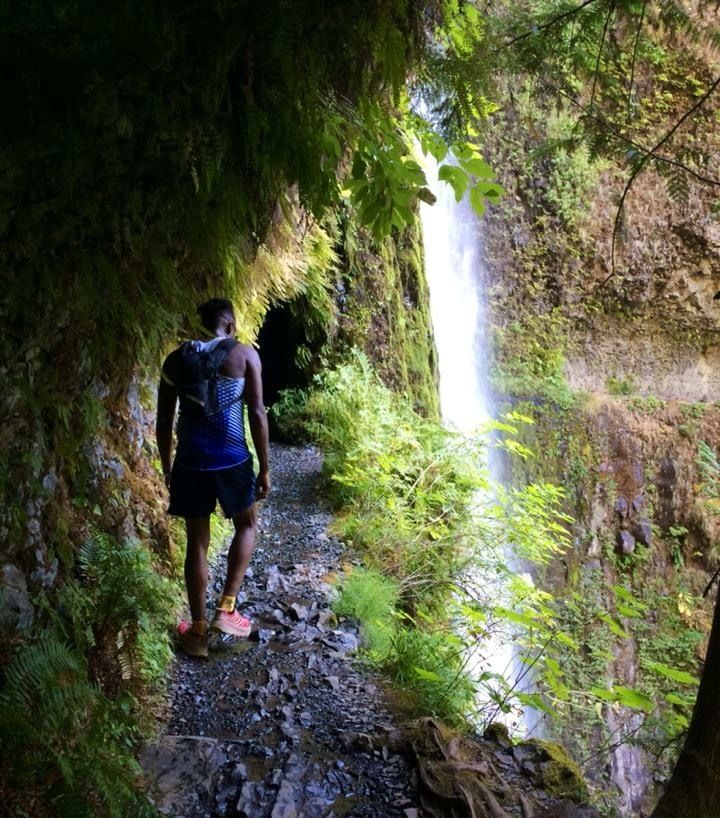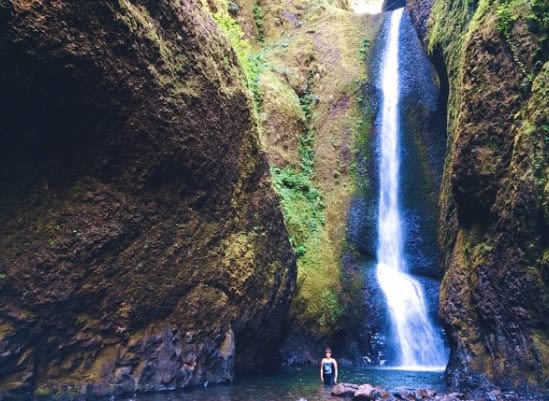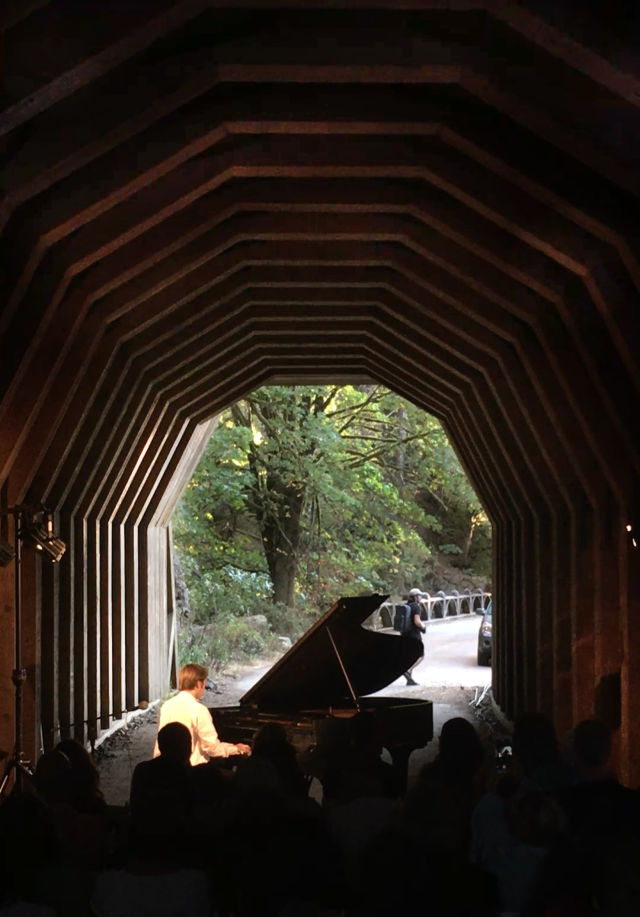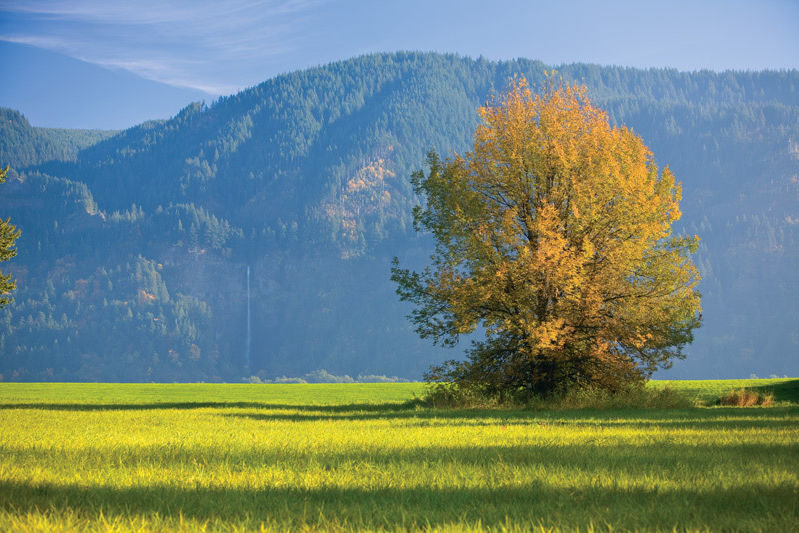As the Columbia Gorge Burns, Reflecting on What This Place Means to Us

Gregory Gourdet, executive chef at Departure, at Tunnel Falls on the Eagle Creek Trail
Image: Courtesy Gregory Gourdet
Gregory Gourdet, executive chef at Departure
Wayne Bund, first-grade teacher, artist, and drag queen
My heart is breaking. As I watch the Eagle Creek fire grow, I am noticing myself go through the stages of grief: despair over the loss of the Gorge, I find myself bargaining with an unknown power and wanting to offer something vital to reverse all this destruction.
The days after my mother passed, I hiked Eagle Creek multiple times. That river canyon became a beacon of hope for me as I tried to figure out my life in the absence of my mother. I was so overwhelmed with grief, I hiked the trail two days in a row because I didn't know what else to do. Eagle Creek has been a personal pilgrimage for me. I hike it every year. The last time I went was on New Year’s Eve, and the path was covered with ice and very slippery.
My grandma had paintings of many Gorge waterfalls in her living room: Oneonta, Multnomah, Punchbowl. They were backgrounds for my childhood, both physical and representational. As I matured and grew, so did my relationships to those paintings and the actual landscapes.
I don’t know what this is other than an expression of grief, an outpouring of sadness for the loss of something so integral to my soul, and important to the Portland area.

Jenny Bruso at Oneonta Gorge
Image: Courtesy Jenny Bruso
Jenny Bruso , creator of Unlikely Hikers
Can one of your greatest loves be a place? I think so. I know so. The Columbia River Gorge showed me who I really am. On its many trails, I learned what my body is made of, and in turn, I did the impossible; I learned to love my body, myself. There, I healed so much trauma and depression and cried so many tears; tears from sheer beauty. Tears of hungover frustration that first time on Angel's Rest. Tears of triumph at the summit of Dog Mountain. All of those tears were like seeds that became roots that became me. I have lived in Portland, Oregon for 14 years and I am still struck with shocked reverence while simply driving through. I’ve proudly shown it off to everyone I possibly could, as if I had something—anything—to do with its mysterious grandeur. The first time I stood on Starvation Ridge looking out at the Columbia River, I felt my first sense of home. It felt as if the river was flowing right through me, it has felt that way since. I’m still finding the words for what the fires are doing to my beloved home. I know that while it may be forever changed, I am forever changing, too, and I plan to see it through this season as I have done every season since we’ve known each other.
Sarah Schroeder Conde, senior account executive at Chirpify
We were married here because your beauty outshined any stain glass window. Your history provided an institution that stood for more than any structure could provide. You may be scarred, but your significance will never be taken away. Columbia Gorge, I love you, I will do everything I can to support your recovery.
Pauline Kim, wardrobe stylist
I took you for granted. My heart is devastated 💔. The Columbia River Gorge has been a sanctuary I've frequented since I was a child. Its majestic spirit is the only place that made me feel at home when I left NYC and felt unsure of my move/future. When I needed to be humbled and grounded, I returned to its trails and it would always remind me that God is definitely real, the world is way bigger than me and to respect my purpose of love. Now we grieve and remind ourselves that we need to be better and take care of our goddess.
Andrea Hussey, site supervisor for Multnomah Education Service District Outdoor School
We start up with kids in a couple of weeks. I don’t know what it’s going to look like in a couple of weeks, if the smoke’s going to be bad. Right now they’re saying not to go outside, but hopefully it will be a lot clearer by then, because that’s our whole program: going outside. Our job at Outdoor School is to teach kids how to be wonderful stewards and appreciate the natural world and expose them to natural spaces, and to have that be at risk is so sad. I hope if anything this can teach our next generation to be thoughtful and be mindful of the choices that they make.
At Outdoor School I tell a big campfire story about the Tillamook Burn, and that Oregon is a state that passed a law to replant after forest fires. In the ’50s, after the Tillamook Burn, they sent high school students and kids out to plant trees. Now you go through the Tillamook Forest and you’re like, “This is a beautiful, healthy, vibrant forest,” but it was something so much different back then. I think that’s part of what started the Outdoor School idea: let’s put kids on buses and take them outside and have them be a part of the natural world.
In the spring we will see growth come back, some green on the ground, some trees that have survived. Little Doug fir seedlings like a little acidic soil sometimes. We’re going to be able, in an unfortunate way and a great way, to watch all that happen. It’s hard not to think about what could happen or when the fire is going to be out. It’s zero percent contained because it’s such a rugged landscape (Editor's Note: As of September 13, the fire is 13 percent contained), but that ruggedness might contribute to not a lot of human impact, and so hopefully that means that plants and the forest can kind of revive itself once those rains come. There’s probably going to be more exposed rock. Fires can also burst boulders out of hillsides, so there might be some changes in that way. But I think we’ll be able to see a lot of growth and resiliency in the next year.
Byron Beck, talk show host and bon vivant
From The Dalles (where I was born) to Portland (where I will likely die), the Columbia Gorge courses through me as much as my own blood. If I have a soul it will likely find itself reflected on the edges of its now-ashen shores or resting on a rock near a trail whose name I long forgot but whose dust I can still taste in my mouth. I want to cry but I can't. I am just too stunned. What will I find when I go back? The charred bones of my childhood? Or someplace forbidding planet that looks like nothing I’ve ever known. My “happy place” is gone, for now.
Naomi Rubottom, owner of clothing store Mes Amies in McMinnville
For almost 10 years we lived in 840 square feet with no outdoor space to call our own. At times having a young child in our small place was challenging, but I grew to appreciate the blessing having no yard provided our family. It pushed us out the door to bigger spaces.
For as long as he has been with us I would load our car and drive us out the Gorge. Often it was just the two of us, at first with him strapped to me because it was too much for his little legs, but then he began walking the trails top to bottom on his own. At first Bridal Veil felt like a long endeavor, taking at least an hour each direction as he explored the trail and walked it all on his own. Now he runs it in 10 to 15 minutes and while he still loves it, for it is familiar and holds so many memories, he prefers a longer trail. He came to love Latourell, Oneonta, Wahclella...all for different magical spots along the trails, for certain trees he knows he can climb up, fit inside, slide through, hide behind. I learned each one intimately along with him.
I don’t worship in a building, or take my son to a congregation to learn about love, kindness, or compassion. The outdoors has become the place I find peace. It feeds the part of me that I identify as spiritual and where I hope he will learn to calm his soul, feed his curiosity and grow to be a man that respects the land and all life. The Gorge has been our weekly place of worship and I am devastated that in his childhood it will no longer be the same place of strength and peace for our daily lives. I am heartbroken by the fires, but we will help plant trees and I will watch them grow together with our family.
Hunter Noack, pianist

Pianist Hunter Noack plays in Oneonta Tunnel last summer.
Image: Courtesy Hunter Noack
It’s somewhat surreal when I look at our pictures from the September 2 In a Landscape concert at the Shire in the Columbia River Gorge. While the crew was setting up for our opening night, Thomas Lauderdale called me from our fort across the river on Sand Island when he saw the first plumes of smoke as the Eagle Creek broke out. From the Shire, John Yeon’s 78-acre haven just across from Multnomah Falls, I performed Bach, Ravel, Liszt, and Schubert while people wandered through the meadow and forest as the moon rose over the falls. The foothills of Mount Hood stood as a backdrop to the water that one guest swears was fluttering in time to the Liszt. During the final piece of the program a flock of snow geese flew west in formation, glowing as they soared through the gorge above the piano. The protected forest was in view for miles, thanks to John Yeon and Nancy Russell, founders of Friends of the Gorge. We had no idea that our shared experience in the landscape that night would become a tribute to the Gorge and its natural wonder.
Yesterday I saw pictures of Oneonta Tunnel burning after these past days of devastation and loss. I dug out the photos and video clips on my computer from our inaugural season last summer and our concert right there in the tunnel. Hikers would emerge from the trail—amazed to see and hear the piano in this landscape—and join us to experience the music moving through those beams and out into the forest. It’s gone now along with our plans to bring the new piano and trailer set up there. I remember sitting at the piano when a cool breeze came in from the west. It was a hot evening and I began the program with Liszt’s “sigh,” Un Sospiro. Playing in the tunnel I felt all the right senses stimulated and simultaneously deeply calm.
I also like what Andy Warhol said: “I think having land and not ruining it is the most beautiful art that anybody could ever want to own.”




